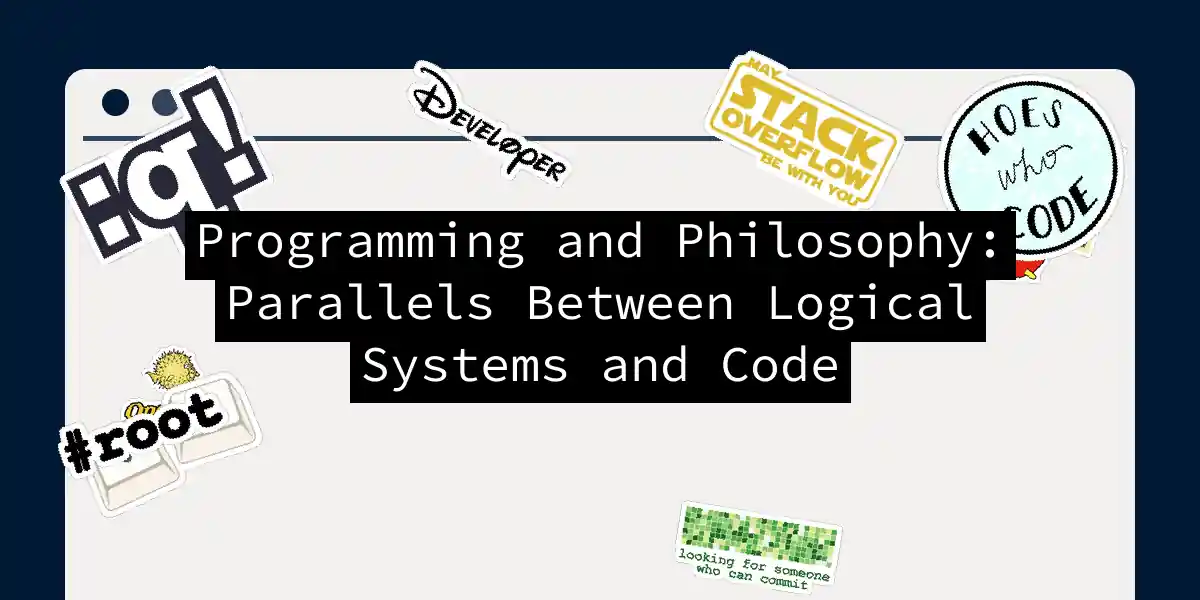The Intersection of Programming and Philosophy
Programming, often viewed as a purely technical discipline, has deep roots in philosophical thinking. The act of writing code is not just about instructing a computer; it involves logical reasoning, problem-solving, and even a touch of creativity. In this article, we will delve into the fascinating parallels between logical systems and code, exploring how philosophical concepts shape the way we write and understand software.
Logical Reasoning in Programming
Programming is essentially a form of logical reasoning. When we write code, we are translating real-world problems into a series of instructions that a computer can execute. This process is akin to the philosophical method of breaking down complex issues into manageable parts and solving them through systematic thinking.
As noted in the concept of the Church-Turing thesis, any effectively calculable function can be computed by a Turing machine, which is a theoretical model for computation. This thesis underscores the idea that programming is about transforming real problems into simple, executable instructions.
Induction and Deduction
Two fundamental methods of logical reasoning are induction and deduction. In programming, these methods are crucial for developing algorithms and ensuring their correctness.
Induction
Induction involves making generalizations based on specific observations. In programming, this translates to writing algorithms that can handle a wide range of inputs. For example, when developing a sorting algorithm, we need to ensure it works for all possible input arrays, not just a few test cases.
Deduction
Deduction, on the other hand, involves drawing conclusions from given premises. In programming, this is akin to writing code that follows a set of predefined rules or specifications. For instance, when implementing a binary search algorithm, we deduce the correct steps based on the properties of binary search trees.
The Role of Abstraction
Abstraction is a key concept in both philosophy and programming. In philosophy, abstraction involves stripping away unnecessary details to focus on the essential aspects of a problem. Similarly, in programming, abstraction helps us manage complexity by hiding irrelevant details and exposing only the necessary information.
For example, consider the concept of a stack in programming. A stack can be implemented using an array or a linked list, but the user of the stack does not need to know these details. The abstraction of a stack provides a simple interface (push, pop, peek) that hides the underlying implementation.
Clean Code and Empathy
Writing clean code is not just about following technical guidelines; it is also about empathy. As Martin Fowler aptly put it, “Any fool can write code that a computer can understand. Good programmers write code that humans can understand”.
Clean code principles such as meaningful variable names, short functions, and proper documentation are essential for making code readable and maintainable. These principles are rooted in the philosophical idea of clarity and simplicity.
Philosophical Underpinnings of Code
The concept of code itself has deep philosophical underpinnings. Code can be seen as a system of rules, a model, or a program that governs the behavior of a system. This is reflected in the etymology of the word “code,” which comes from the Latin “codex,” meaning a set of rules.
In this sense, code is not just a technical artifact but a philosophical construct that embodies the principles of creation, communication, and regulation. It is a way of translating abstract ideas into concrete actions, much like how philosophical theories are translated into practical applications.
The Ontology of Code
The ontology of code involves understanding its fundamental nature and role in the world. Code is more than just a set of instructions; it is a model that reflects and shapes reality. For instance, genetic code contains the instructions for creating life, while computer code controls the behavior of machines.
This perspective highlights the constructive, communicative, and regulatory functions of code. It is a system that not only reflects reality but also shapes it, much like how philosophical theories influence our understanding of the world.
Conclusion
The intersection of programming and philosophy is rich and multifaceted. By understanding the logical systems and philosophical concepts that underlie coding, we can write better, more maintainable software. It is not just about writing code; it is about solving problems, managing complexity, and creating systems that are both efficient and elegant.
As programmers, we are not just technicians; we are philosophers in our own right, navigating the complexities of the digital world with logic, creativity, and empathy. So the next time you sit down to write code, remember that you are part of a long tradition of logical reasoning and philosophical inquiry. Happy coding
